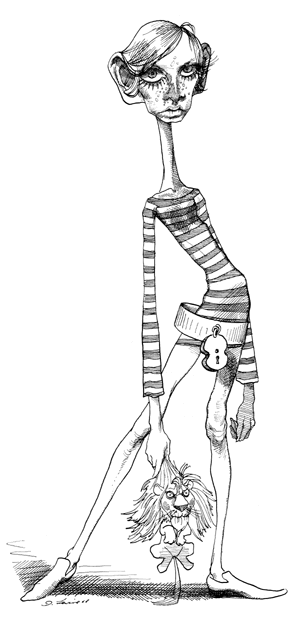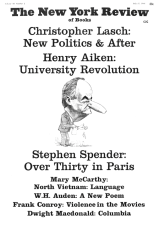There is little point in insisting that each book one examines reflects the Zeitgeist. The temptation, nevertheless, is there—especially in the case of so minimal a subject as Twiggy and Justin, an account of their visit to New York in the spring of 1967. Twiggy, you will recall, is a photographer’s model, very young, very thin, British working class, inarticulate, an occasional reference point (by virtue of her short hair and flat chest) for the decline of sexual differentiation in the world today. Justin de Villeneuve is her creator and manager, somewhat older, shrewd, a symbol in his way of the rise of the working class. Last year they came to America to more fully exploit Twiggy’s international commercial possibilities, and the media made a fuss about them for a while—hard news having been harder to come by that year than this. Thomas Whiteside was one of the people who followed Twiggy and Justin around, later reporting on their activities at some length in The New Yorker. Book length, as it now turns out. Why would Whiteside want to write about them, one wonders? As Twiggy might say, “I dunno. Ask ‘im.”
I suppose Whiteside intended to demonstate, through a kind of journalism verité, how a popular idol is created by commercial interests and sustained by artificial news-making until that moment when the great populace (here, the American adolescent) rises to embrace the new heroine and reach for the products she endorses. This might have been a moderately useful, if familiar, essay had the cult of Twiggy materialized in America—but it never did, although one would not know this by reading Whiteside’s book.
TRUE POPULAR CULTURE HEROES, like good popular songs, have about them something melancholy—a quality of temporality which never can be altogether ignored. They mark with precision a time, a place, a way we were. It is exactly the ephemeral nature of their success that touches us, making them seem mythopoeic. The long-haired rock musicians are already growing bald. Bardot fades before our eyes. Twiggy, however, did not have that air at all. For us, she had merely lack of substance.
The Twiggy phenomenon as an object of mass fixation actually existed only in England where it began and where, I have been told, it is still more or less extant. Something to do, I believe, with the loss of empire and the reverse caste system that the British young have been toying with for a while. In America, however, the excitement remained largely in the minds of the grown-ups; the fashion writers, the editors, the merchandisers—those people who imagine that they create style. The children here, who like things more raunchy, were not impressed by this innocent London shop girl who talked lovingly of her Mum and Dad and lived at home. Further, Twiggy had the look of a waitress in a diner in Nashville, the face of the Anglo-American poor in the hill country, the quality of a Walker Evans photograph. She resembled the devitalized, not the revolutionary poor; the poor who have trouble but who do not make it. Clearly not a glamorous image for this country at this time.
Mrs. Vreeland, the editor of Vogue, thought, however, that Twiggy was beautiful and ordered her photographed for the magazine by Avedon. “Twiggy…is bringing her generation in front of the camera…representative of the period…” said Avedon. “Not that she doesn’t have some faults—the occasionally vacant stare, the dead eye….”
Meanwhile, Twiggy moved through the city giving interviews, posing, saying “I dunno,” and “I’m ‘ongry,” and “Congress? What’s that?” while Justin scooted from deal to deal thinking about Twiggy’s hourly wage rates.
“At a hundred and twenty dollars an hour,” Twiggy’s modeling agent told them one day, “that would be nine-hundred and sixty dollars today.”
Twiggy and Justin met John Paul Getty at a party and began to believe they were part of the structure of wealth and power, a not uncommon delusion among the affluent powerless who have yet to discover that wealth is not clothing, a house, and an expensive car, and power is not what movie actors and baseball stars wield when they stump for candidates.
The dumb show continued, directed by the grown-ups who persisted in their attempts to recast youth in an acceptable image. Twiggy was what they so badly wanted to believe youth was: empty, uneducated, passive, without opinions, undemanding, asexual. As Justin said, “Twiggy has a pure clean image, and anything that conflicts with that image—I won’t have it.”
Apolitical, also. One day, in New York, Justin walked past a peace demonstration and did not appear to notice it. In Twiggy (Hawthorn Press), Twiggy writes: “Dying is awful and wars are awful…I’m against the bomb and all that, but I wouldn’t know what to do about it. I mean I’m not strong minded enough to march or do anything like that….”
Advertisement
Still, the American children went on liberating themselves, marching against authority, and being verbal. The girls grew their hair even longer, and the fashions marketed as Twiggy’s hung far too long on the racks of stores.
There was, Justin felt, something wrong with the response to Twiggy in America. “The Ford people wanted Twiggy to appear at their stand at the motor show for half an hour the other day,” he complained, “I don’t want Twiggy to exhibit herself on a stand. And all they offered was for us to have the use of a mustang while we’re over here…. Over in London, the car manufacturers give Twiggy cars.”
Far from being fashionable, Twiggy and Justin appeared anachronistic: Twiggy, the Gigi-like chattel; Justin, her Edwardian protector saving her from corruption now in order to deliver her to a more lucrative corruption later.
As for Whiteside’s report, it is a kind of journalism which is itself anachronistic. Like some documentary cinema which in exposing all truth reveals no truth (Jason, for example), this once chic form no longer seems to work. Its pretense of objectivity, its lack of analysis, its bright slick surface lately appear false. It is a form used not to enlighten or question, but to appeal to the vanity of an audience which knows, a priori, exactly what is happening all over, what will happen, and what it means. Only we really don’t know all that any more, do we? Not even about Twiggy and Justin, I suspect.
This Issue
July 11, 1968




